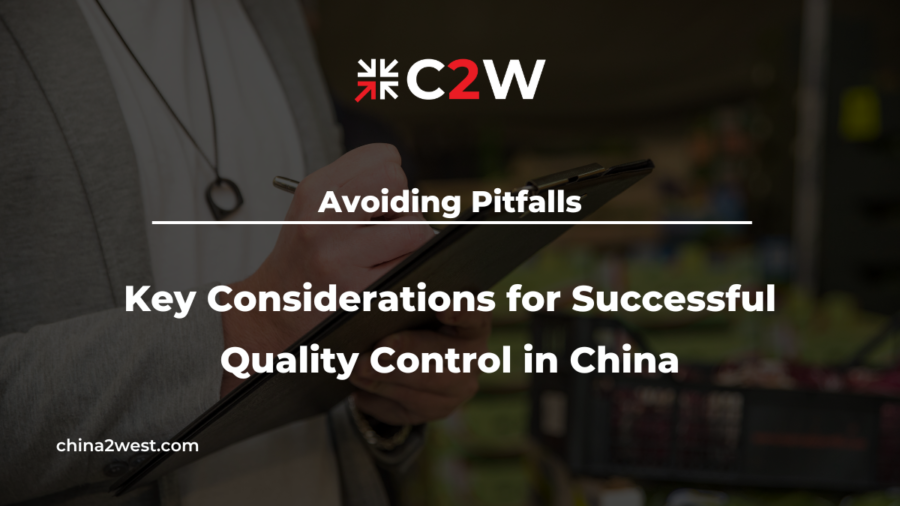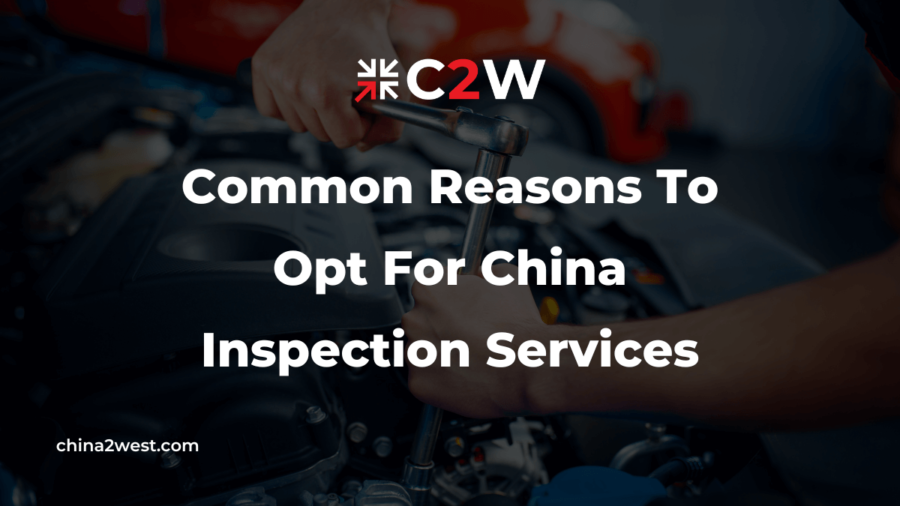The allure of sourcing from China is undeniable, attracting businesses of all sizes and industries worldwide. However, as the saying goes, “not all that glitters is gold,” and the same holds true for manufacturing in China. When importing goods from China, ensuring the quality of the product is an essential factor to consider. Quality control in China is an important process that can help importers avoid potential pitfalls, allowing them to achieve successful outcomes. This blog post will provide an overview of the key considerations for successful quality control in China, helping importers identify and mitigate any issues that could arise. From managing supplier selection and audit processes to establishing effective communication channels and setting up on-site production control, this post will cover the essential elements of quality control in China.
Considerations Before Beginning Production in China
Before starting production in China, there are several important factors that importers should consider. These factors can help ensure a smooth and successful manufacturing process while avoiding potential issues that could arise.
One key factor to consider is the factory’s production capacity. It is crucial to assess whether the factory can meet your production requirements within the desired timeframe. This includes considering the factory’s equipment, resources, and workforce. It’s also important to evaluate the factory’s track record and experience in manufacturing products similar to yours. A factory with a proven track record will likely have a better understanding of your specific product requirements and quality standards.
Another factor to consider is the factory’s location. Proximity to shipping ports and transportation infrastructure can greatly impact logistical efficiency and costs. Choosing a factory that is located near a major port can help reduce transportation time and costs.
Additionally, it’s important to evaluate the factory’s quality control procedures. This includes assessing their inspection processes, testing protocols, and adherence to quality standards. Requesting samples and conducting factory audits can provide insight into the factory’s quality control practices.
Lastly, communication is crucial when beginning production in China. Clear and effective communication with your factory is essential for conveying your product requirements, specifications, and expectations. It’s important to establish a reliable and efficient communication channel with your factory to ensure that any issues or concerns are addressed promptly.
Choosing the Right Factory for Your Product
When it comes to importing goods from China, choosing the right factory for your product is a crucial step in ensuring quality control. With countless factories to choose from, it can be overwhelming to determine which one is the best fit for your needs. However, by considering a few key factors, you can make an informed decision that sets you up for success.
First and foremost, it’s important to evaluate the factory’s expertise and experience in manufacturing products similar to yours. A factory that has a proven track record in producing goods similar to what you’re looking for will likely have the knowledge and understanding of your specific product requirements and quality standards.
Another factor to consider is the factory’s size and production capacity. Assess whether the factory can handle your production requirements within your desired timeframe. Look into their equipment, resources, and workforce to ensure they can meet your needs efficiently and effectively.
In addition to expertise and capacity, it’s crucial to assess the factory’s quality control procedures. Look into their inspection processes, testing protocols, and adherence to quality standards. Requesting samples and conducting factory audits can provide valuable insight into their quality control practices.
Finally, communication is key. Establishing a strong and reliable communication channel with your factory is essential for conveying your product requirements, specifications, and expectations. Clear and effective communication will ensure that any issues or concerns are addressed promptly and that everyone is on the same page throughout the production process.
Establishing a Quality Control Plan with Your Supplier
When it comes to quality control in China, establishing a solid plan with your supplier is crucial. This ensures that everyone is on the same page and that your expectations are communicated.
To establish a quality control plan, start by clearly defining your product requirements and quality standards. Provide detailed specifications and guidelines to your supplier, including any specific tests or inspections that need to be conducted. This will help them understand your expectations and ensure that the final product meets your standards.
Next, discuss with your supplier how you will monitor and control the production process. Determine the frequency of inspections and tests, as well as the criteria for accepting or rejecting products. It’s important to establish a reliable and efficient communication channel to promptly address any issues or concerns that may arise during production.
Additionally, consider establishing a process for resolving nonconformities or defects. Determine how you and your supplier will handle any defective products, including the process for returns, replacements, or refunds.
Dealing with Nonconformities: How to Handle Defective Products
Dealing with non-conformities and handling defective products is an inevitable part of quality control in China. Despite your best efforts, there may be instances where products do not meet the required standards or specifications. In such cases, it’s crucial to have a clear plan in place to address these issues effectively.
First and foremost, open and transparent communication with your supplier is key. As soon as you identify any nonconformities or defects, promptly inform your supplier and provide them with clear documentation and evidence. This will ensure that they understand the issue and can take immediate action to rectify it.
Next, work collaboratively with your supplier to determine the best course of action for resolving the nonconformities. This may involve reworking the defective products, replacing them, or implementing changes to the production process to prevent similar issues in the future.
It’s important to establish a process for returns, replacements, or refunds, and communicate this process to your supplier. Ensure that there are clear timelines and expectations for resolving the issue and delivering the required quality.
Regularly follow up with your supplier to ensure that the necessary actions have been taken and that the nonconformities have been effectively addressed. By maintaining a strong and open relationship with your supplier, you can navigate these challenges more effectively and ensure the ongoing quality of your imported goods.
Navigating Quality Control in China
China has undoubtedly made a name for itself in the global market as a go-to destination for businesses looking for affordable manufacturing options. Companies from around the world flock to China in search of top-notch products at unbeatable prices. But amidst this booming industry, it can be challenging to maintain quality control standards in China. To ensure that products meet the highest standards and that business relationships remain fruitful, navigating the intricacies of quality control in China is essential.
As a supply chain leader in the Greater Bay Area in China, China 2 West, a prominent supply chain leader in the Greater Bay Area in China, is unwavering in its dedication to delivering the finest client experience. Our skilled team of professionals comprehends the intricate details of quality control and extends the necessary support to guarantee project success for businesses. Our exceptional commitment to offering unrivaled quality products positions us as a reliable partner in any manufacturing project. So, if you aim to accomplish your objectives while maintaining the highest possible quality, contact us today to explore how our expert team can assist you.




